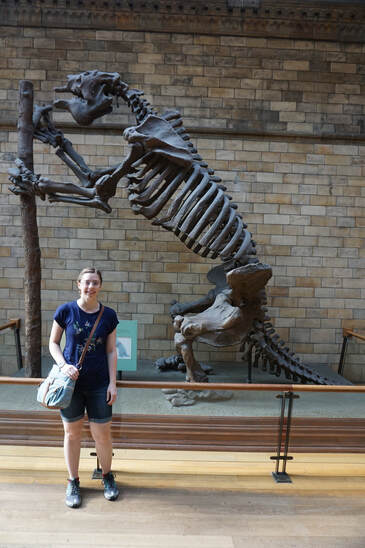|
Photo is me standing in front of the fossil of a giant sloth at London's Natural History Museum. Photo credit to my husband. One of the toughest parts of writing is doing background research, and doing it well. Details like the names of various sword shapes, how memory function works, and the physics behind a laser-weapon may not make or break your plot. But inconsistencies and inaccuracies will cause some readers to put your book down, and never pick up any of your books again.
So let's discuss how to find accurate information! 1. Google Yes, just google it is my first tip. You'd be surprised at how easy it can be to find reputable sources. Remember that .edu and .org are often your best friends. A random blog post, or even a wikipedia page are not enough if you want to be confident about your topic. If you find conflicting information, write both pieces of information down and come back to it later. Google the newest science advances too. This can be excellent for sci-fi writers who want to dream up futuristic tech. New tech can inspire you to extrapolate that into what will be used 100 or 1000 years from now. 2. Museums I went to the Natural History Museum in London (I was in London for other reasons, I didn't fly over an ocean for a WIP). But I used the opportunity to do research for my next project, which includes many paleolithic species. I took great photos of the skeletons, read all their posted info, and used myself as a measuring stick to get the scale right. (After all, I needed to know if a giant sloth would loom over a person or be about the same size. Per the photo above, it will loom). There are tons of museums around the world which you could visit to get inspiration and research for your work too. Yes sci-fi too, you can't forget science museums! 3. Find an expert or five Use google scholar to look up academic papers about your area of interest. If the article is behind a paywall, politely email the professor who wrote it, and 99% of the time they'll be happy to send you a pdf. It costs them nothing. They don't make money from the published version anyway. Once you've read their paper, you can also ask them questions about the topic. They may have other papers, or even on-going research they could chat about. Other types of experts include people who work/worked in the field outside academia. They may have websites with blogs about their experiences or published interviews. 4. Read other books that cover the topic And then look at their resources. Maybe they list a certain museum, academic, or other resource in their acknowledgements. If it's non-fiction, they'll have a bibliography. Unlike the internet, you can almost always trust that traditionally published books were fact checked. The newer the publication the better, as it will have the most up to date information. For particularly dense/complex topics, you can google classes (aerospace engineering 101, for example) and see what textbook is required for the students. Old copies are available online for pretty cheap, especially at the end of a semester. 5. Libraries This ties into 4 well, but people often forget about their local library. You can talk to a librarian for suggestions, browse books in both non-fiction and fiction, and use their internet too. Some libraries have study rooms you can take over. This can not only offer you so many amazing resources, but it can help keep you focused on working since it's a quiet environment. Plus, who doesn't love their local library? Did this post help you on your research journey? Do you have any other tips for how to find the information you need to better build your SFF worlds? Let's discuss in the comments below!
0 Comments
Leave a Reply. |
Archives
April 2024
Categories
All
|


 RSS Feed
RSS Feed